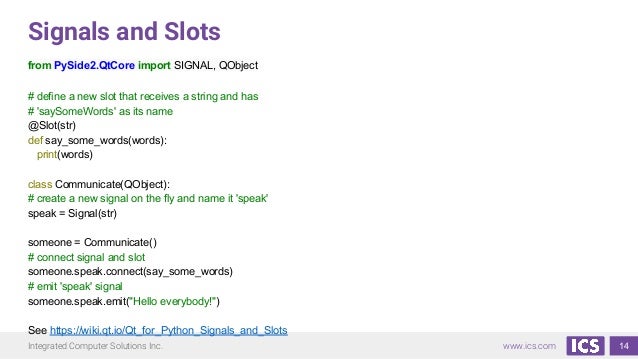Multiple Signals And Slots Python
This section describes the older style for connecting signals and slots. Ituses the same API that a C++ application would use. This has a number ofadvantages.
- Multiple Signals And Slots Python Cheat
- Multiple Signals And Slots Python Ide
- Multiple Signals And Slots Python Compiler

- It is well understood and documented.
- Any future changes to the C++ API should be easily included.

It also has a number of disadvantages.
- Basically, connecting two signals is a simplified version of connecting a signal and a slot, while the slot is meant to emit another signal. As for priority, the slot(s) of the latter signal will be handled when the event loop is returned to the object. However, it is impossible to connect two slots because the mechanism requires a signal while.
- A slot refers to the method containing the code that you want to be executed on the occurrence of a signal. Most widgets have predefined slots; you don't have to write code to connect a predefined signal to a predefined slot. You can even edit a signal/slot by navigating to the Edit Edit Signals/Slots tool in the toolbar.
- This package provides a simple and stupid implementation of the Signal/Slot pattern for Python. Wikipedia has a nice introduction: Wikipedia has a nice introduction: Signals and slots is a language construct introduced in Qt for communication between objects1 which makes it easy to implement the Observer pattern while avoiding boilerplate code.
- It requires knowledge of the C++ types of signal arguments.
- It is error prone in that if you mis-type the signal name or signature thenno exception is raised, either when the signal is connected or emitted.
- It is verbose.
- It is not Pythonic.
This older style of connecting signals and slots will continue to be supportedthroughout the life of PyQt v4.
The signal.signal function allows defining custom handlers to be executed when a signal is received. A small number of default handlers are installed: SIGPIPE is ignored (so write errors on pipes and sockets can be reported as ordinary Python exceptions) and SIGINT is translated into a KeyboardInterrupt exception if the parent process has not changed it. A slot is a Python callable. If a signal is connected to a slot then the slot is called when the signal is emitted. If a signal connected then nothing happens. The code (or component) that emits the signal does not know or care if the signal is being used.
PyQt Signals and Qt Signals¶
Qt signals are statically defined as part of a C++ class. They are referencedusing the QtCore.SIGNAL() function. This method takes a single stringargument that is the name of the signal and its C++ signature. For example:
The returned value is normally passed to the QtCore.QObject.connect()method.
PyQt allows new signals to be defined dynamically. The act of emitting aPyQt signal implicitly defines it. PyQt v4 signals are also referenced usingthe QtCore.SIGNAL() function.
The PyQt_PyObject Signal Argument Type¶
It is possible to pass any Python object as a signal argument by specifyingPyQt_PyObject as the type of the argument in the signature. For example:
While this would normally be used for passing objects like lists anddictionaries as signal arguments, it can be used for any Python type. Itsadvantage when passing, for example, an integer is that the normal conversionsfrom a Python object to a C++ integer and back again are not required.

The reference count of the object being passed is maintained automatically.There is no need for the emitter of a signal to keep a reference to the objectafter the call to QtCore.QObject.emit(), even if a connection is queued.
Short-circuit Signals¶
There is also a special form of a PyQt v4 signal known as a short-circuitsignal. Short-circut signals implicitly declare each argument as being oftype PyQt_PyObject.
Short-circuit signals do not have a list of arguments or the surroundingparentheses.
Short-circuit signals may only be connected to slots that have been implementedin Python. They cannot be connected to Qt slots or the Python callables thatwrap Qt slots.
PyQt Slots and Qt Slots¶
Qt slots are statically defined as part of a C++ class. They are referencedusing the QtCore.SLOT() function. This method takes a single stringargument that is the name of the slot and its C++ signature. For example:
The returned value is normally passed to the QtCore.QObject.connect()method.
PyQt allows any Python callable to be used as a slot, not just Qt slots. Thisis done by simply referencing the callable. Because Qt slots are implementedas class methods they are also available as Python callables. Therefore it isnot usually necessary to use QtCore.SLOT() for Qt slots. However, doing sois more efficient as it avoids a conversion to Python and back to C++.
Qt allows a signal to be connected to a slot that requires fewer arguments thanthe signal passes. The extra arguments are quietly discarded. PyQt slots canbe used in the same way.
Note that when a slot is a Python callable its reference count is notincreased. This means that a class instance can be deleted without having toexplicitly disconnect any signals connected to its methods. However, if a slotis a lambda function or a partial function then its reference count isautomatically incremented to prevent it from being immediately garbagecollected.

Connecting Signals and Slots¶
Connections between signals and slots (and other signals) are made using theQtCore.QObject.connect() method. For example:
Multiple Signals And Slots Python Cheat
Disconnecting signals works in exactly the same way using theQtCore.QObject.disconnect() method. However, not all the variations ofthat method are supported by PyQt. Signals must be disconnected one at atime.
Emitting Signals¶
Any instance of a class that is derived from the QtCore.QObject class canemit a signal using its emit() method. This takes a minimum of oneargument which is the signal. Any other arguments are passed to the connectedslots as the signal arguments. For example:
Multiple Signals And Slots Python Ide
The QtCore.pyqtSignature() Decorator¶
Multiple Signals And Slots Python Compiler
The QtCore.pyqtSignature() serves the same purpose as thepyqtSlot() decorator but has a less Pythonic API.